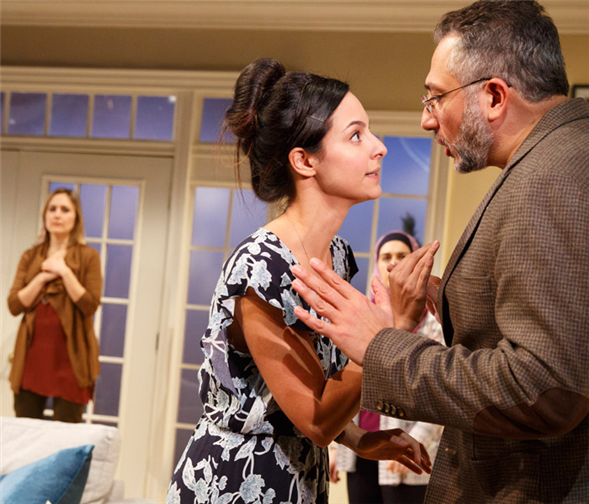Translate Page

Culture and religion clash in a new play
---
Welcome to Building Character, TDF Stages' ongoing series on actors and how they create their roles
It's tempting to conflate tolerance with liberalism, but the two don't always go hand in hand.
That idea is central to Zayd Dohrn's new play The Profane, currently at Playwrights Horizons. In the show, Raif and Naja Almedin are upper-class Manhattanites – he's a lauded author and she's a retired dancer. They immigrated to the United States when they were young, cut all ties to their Islamic roots, and assimilated into the lives of secular American artists. So when their daughter Emina comes home from college and announces her engagement to a man from a conservative Muslim family, it's a prime opportunity for these New York liberals to show just how accepting and inclusive they can be.
They can't quite get there, however. Not when it comes to their own daughter.
While Raif and his writing loom large in play (even Sam, his daughter's fiancée, is enamored with his early work), it's Emina, played by Tala Ashe, who's at the heart of this story. A 21-year-old student, the character is confident in her newfound Islamic faith and in her love for Sam, and most of all, she's certain that her parents are dead wrong in their objections to both.
In preparation for the role, Ashe read the works of Muslim scholars and researched more progressive sects of Islam in which women don't wear hijabs and gender equality is more prevalent. "To me, that's the rhetoric that would make sense for Emina," she says. "I do believe she's a feminist and that the values her parents instilled in her are still there. I don't think she's seeking a clichéd form of subservience that you can see in depictions of Islam. I think, to Emina, being Muslim differentiates her. When you're young and especially when you're in college, there is a need to diverge from the ideals that you were raised with and to grow up in your own way. This is her first foothold into adulthood."
{Image1}
Part of what has draws Emina to Islam is the allure of a culture that her parents left behind. "I was born in another country but was raised in America," says Ashe, who was born in Iran. "I think when that's the case, there's still this lingering, phantom connection. That's something Emina is dealing with that I can identify with. And Emina's parents and even her sister, they're all involved in the arts. She doesn't have that. She's the odd one out. So I think she was looking for a community of her own and she's found that in religion."
Emina is described throughout the show as an extremely thoughtful person, which matters to Ashe. "I think what allows me to get up there each performance and stand by what Emina is doing is her surety," she says. "There's a strength that she's gained through this new faith: it's a strength I don't think she's ever had before. She knows that this is the man she wants to be with. As silly as it might seem to someone older and especially to her parents, I do think she met Sam and he really saw her. And Sam is a part of this large family and a Muslim community, which I think is also attractive to her."
Despite the confidence that Emina has in her choices, her family remains baffled by them. Her father in particular is irreligious to the point of being anti-Islam. When Sam invites the Almedins to meet his parents, Raif and Naja can't contain their prejudices, and things to get ugly in a hurry. When tensions erupt between her family and her future in-laws, Emina is forced to take sides.
"Merging families is always a complicated thing, but in this case, for Sam and Emina, there are certainly more hurdles standing in their way," Ashe says. "For Emina to see how her parents behave in these situations, it's crushing for her, but it's also galvanizing. I think part of becoming an adult is recognizing the fallibility of your parents. There's something about moving away from home and then coming back to visit: you see things that you couldn't before. You begin to see your parents as people."
---
Follow Haley Chouinard at @HaleyChouinard. Follow TDF at @TDFNYC.
Photos by Joan Marcus. Top photo (L to R): Heather Raffo, Tala Ashe, Ali Reza Farahnakian.
TDF Members: Go here to browse our discounts for theatre, dance, and concerts.